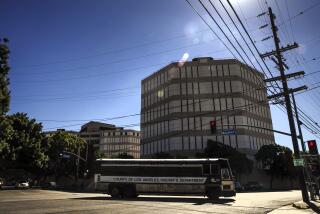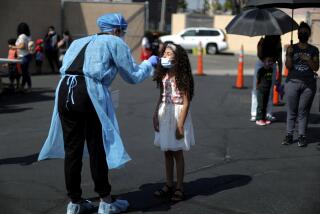Dozens of inmates test positive for virus at San Diego federal jail, defense attorneys say
SAN DIEGO — At least 56 inmates tested positive for the coronavirus last week at a privately run federal jail in downtown San Diego that houses mostly pretrial inmates, according to defense attorneys briefed on the matter.
GEO Group, which contracts with the U.S. Marshals Service to operate the Western Region Detention Facility, is in the process of testing all inmates there “whether or not they are showing any symptoms,” said Kathy Nester, executive director of Federal Defenders of San Diego.
“Today we received confirmation of a large number of positive tests arising from that ongoing testing,” Nester wrote in an email Friday.
She said 286 inmates were tested Thursday, and of those, 56 tests came back positive, 114 were negative and 116 were pending.
An additional 221 tests were submitted Friday, with all of those results still pending, Nester said.
She said information about the apparent coronavirus outbreak was provided in a Friday phone call with the Marshals Service, which gives Federal Defenders regular updates “advising us of our clients who have tested positive and when there are ongoing quarantines” at its facilities.
“We are extremely worried about the rate at which the coronavirus is spreading through our detention facilities and the impact that will have on our clients and the community at large,” Nester wrote.
A representative for GEO Group referred a request for comment to the marshals. Calls to the San Diego-area office of the Marshals Service were not answered Friday.
According to GEO Group, the Western Region Detention Facility can house up to 770 inmates and is accredited by two national correctional organizations.
In April, Voice of San Diego reported that inmates at the facility reported cramped conditions at the jail that did not allow for social distancing. According to the declaration cited in the report, written by Federal Defenders senior litigator Joshua Jones and signed March 31, inmates at the facility reported several other safety concerns, including a lack of hand sanitizer in housing units and a scarcity of soap.
A study published in September in the Annals of Epidemiology found that “jails are epicenters of COVID-19 transmission in the United States.”
The study’s authors wrote that jails “present an ideal setting for infections to spread” because “incarcerated individuals are at higher risk for infection due to unsanitary living conditions and inability to socially distance.” Additionally, the authors wrote that “correctional officers rarely have public health training, and correctional health systems are chronically underfunded.”
Two of the study’s authors, from Stanford University, said an outbreak inside a jail threatens the community outside because “the people who work there enter and leave every day. They can take the virus out into the community when they go home at night.”
The apparent outbreak at the Western Region Detention Facility follows an outbreak at the Metropolitan Correctional Center, another federal jail in downtown San Diego.
As of Friday, there were three confirmed coronavirus cases among inmates at the Metropolitan Correctional Center, according to the Federal Bureau of Prisons, which operates the Union Street facility.
But Federal Defenders, whose attorneys represent most indigent defendants charged with federal crimes, said in September that at least 405 out of the more than 550 inmates housed there had tested positive for the virus at some point, according to data they compiled based on updates from prison officials.
Prison officials reported 48 inmates and 12 staffers with active coronavirus cases Sept. 28, when activists and family members gathered across across the street to hold a vigil for 47-year-old Victor Ray Cruz, who attorneys said died of COVID-19.
Riggins writes for the San Diego Union-Tribune.
SPONSORED CO
More to Read
Sign up for Essential California
The most important California stories and recommendations in your inbox every morning.
You may occasionally receive promotional content from the Los Angeles Times.











